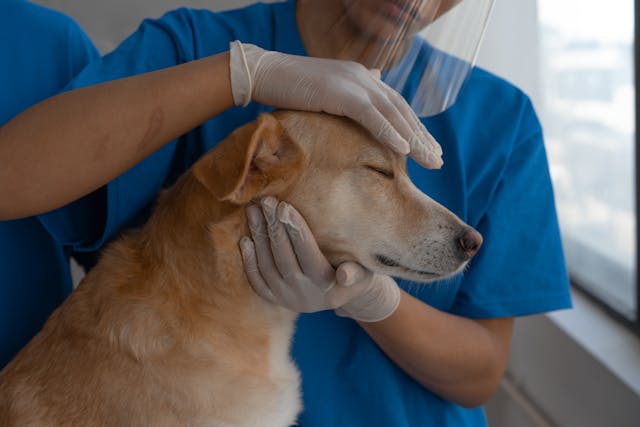Many pet parents are turning to probiotics as part of their dog’s wellness routine, especially when they want to support gut health, immune function, and seasonal comfort. But with so many options on the market, each with different formulas, benefits, and price points, it can be tough to know where to start. Are probiotics really worth adding to your dog’s daily routine?
In this article, we’ll explore the key benefits of probiotics for dogs, take a look at PetLabCo.’s Probiotic Chews, and highlight expert insights from veterinarians, to help you decide if adding a probiotic to your dog’s routine is the right choice.
What Are Probiotics For Dogs and What Do They Do?
Probiotics are beneficial bacteria that may help support your dog’s digestive system by promoting a healthy balance of gut microflora. A balanced gut can play a role in digestive function, immune response, and overall wellness.
These helpful microbes are thought to:
- Support normal digestive function: Probiotics may help maintain healthy stool consistency and digestive balance.
- Help maintain gut barrier integrity: A healthy digestive tract can support immune function and nutrient absorption.
- Support a normal immune response: For some dogs, probiotics may help during seasonal changes that bring occasional itching or paw licking.
- Promote overall gut wellness: A balanced microbiome supports daily comfort and gastrointestinal health.
- Support your dog during environmental changes: Some pet parents notice their dogs adjust more easily to seasonal shifts when probiotics are part of their daily routine.
With consistent daily use, probiotics can become a helpful part of your dog’s wellness routine, supporting them from the inside out.
Probiotics for Dogs: Weighing the Pros and Cons
Like any supplement, probiotics come with their own set of benefits and considerations. While many pet parents report noticeable benefits to their dog’s digestive or seasonal comfort, it’s important to look at the full picture before adding anything new to your dog’s routine. Here’s a quick breakdown of the potential pros and cons of giving your dog a daily probiotic:
| Pros | Cons |
| May help support digestive health and normal stool consistency | Not a substitute for veterinary care |
| Can help maintain immune function | May not be suitable for dogs with certain medical conditions |
| May support your dog during seasonal or environmental sensitivities | Results may take time and vary between dogs |
| Easy-to-give soft chew format (vs. pills or powders) | Requires consistent daily use for best results |
| Can be part of a long-term wellness routine | Some formulas may vary in quality – research is key |
While probiotics aren’t a cure-all, they can be a helpful addition to your dog’s daily routine, especially if you’re looking to support gut health, immune function, or seasonal sensitivities. As with any supplement, the key is consistency and choosing a high-quality, vet-reviewed formula. If you’re unsure whether probiotics are right for your pup, it’s always a good idea to check in with your veterinarian first.
Step-by-Step Guide to Giving Your Dog Probiotics
Adding a probiotic to your dog’s routine doesn’t have to be complicated. Whether you’re just starting out or looking for the easiest way to stay consistent, a little preparation can go a long way. Below is a simple step-by-step guide to help you introduce probiotics into your dog’s daily routine and make it something they (and their gut) look forward to.
- Choose a High Quality Product
Look for a dog probiotic that uses high-quality ingredients, has transparent labeling, and is backed by positive customer feedback. - Check the Usage Guidelines
When giving your dog probiotics, it’s really important to follow the usage guidelines and follow the serving instructions based on your dog’s weight and size. - Use Consistently
Probiotics are designed to be a daily supplement given consistently over time. If you give your dog their probiotics at the same time each day, many pet parents notice benefits within 3 months of consistent daily use.* - Watch for Changes
Keep an eye on your dog’s digestion, stool consistency, energy levels, coat condition, and overall behavior. Small positive changes, such as more regular bathroom habits, reduced paw licking, or a shinier coat, may be signs the probiotic is supporting your dog’s gut and immune health. Every dog is different, and changes may be subtle or take longer to appear. - Consult Your Veterinarian
If your dog has known sensitivities, is currently taking medication, or has any underlying health conditions, it’s best to check in with your vet before starting a probiotic. They can help determine if it’s a good fit for your pup’s specific needs and ensure it won’t interfere with any existing treatments or dietary plans.
Vet Advice on Dog Probiotics
Veterinarians often recommend probiotics as part of a broader approach to supporting your dog’s digestive and immune health, especially during times of change or occasional stress. While every dog is different, probiotics may be helpful in situations like:
- Transitioning to a new diet
- Occasional digestive upset (like loose stool or gas)
- During travel or boarding
- Seasonal shifts that may trigger sensitivities
Most vets agree that the gut plays a major role in overall health, and supporting a healthy balance of gut bacteria can have a positive effect on everything from digestive function to immune response. That said, not all probiotic products are created equal. Many veterinarians recommend choosing a vet-reviewed supplement that’s formulated with high-quality, research-backed strains, ideally one that’s designed specifically for dogs.
It’s also worth noting that probiotics are most beneficial when given consistently over time. While some dogs may show benefits quickly, others may take a few weeks to adjust. Always talk to your veterinarian if your dog has existing health conditions, is on medication, or if you’re unsure whether a supplement is appropriate for your pup’s individual needs.
America’s Bestselling Probiotics: PetLabCo. Probiotic Chews**
PetLabCo.’s Probiotic Chews are soft, pork-flavored supplements formulated with a proprietary blend of probiotics, prebiotics, and postbiotics. This formulation is designed to support digestive health and normal immune function, especially during seasonal transitions.
Key Features:
- Soft-chew format, pork flavored
- 3 Billion CFU proprietary probiotic blend per soft chew (B. coagulans, B. clausii, B. subtilis)
- Includes Prebiotics (FOS, GOS) and Postbiotics (Yeast blend)
- Formulated to help support normal digestive and immune function
- Vet-reviewed, manufactured in the USA from domestic & globally sourced ingredients
FAQs: Probiotics for Dogs
Q: Can probiotics help with my dog’s seasonal allergies?
A: Probiotics may help support your dog’s normal immune response to occasional or seasonal allergies. Some pet parents notice fewer signs of seasonal sensitivity, like occasional itching, head shaking, or paw licking, when their dog is consistently taking a probiotic. While they’re not a cure, probiotics can be a helpful part of a broader wellness routine, especially during high-allergen seasons. Always look for qualified claims like “may help” or “can support” when choosing a supplement.
Q: Can I give probiotics to a puppy?
A: PetLabCo.’s Probiotic Chews are suitable for dogs aged 12 weeks and older. As with adult dogs, consistency is key, and starting early may help support a healthy gut microbiome as your pup grows. For younger puppies or those with known health concerns, check with your vet to confirm it’s a good fit for their specific needs.
Q: How long does it take for probiotics to start working?
A: Every dog is different, but many pet parents begin to notice subtle changes, like more regular digestive function or improved stool consistency, within 3 months of consistent use*. The key is daily use and sticking to the recommended serving size for your dog’s weight.
Q: Can I give probiotics with other supplements or medications?
A: Probiotics are often used alongside other health supplements, but if your dog is on medication or has specific dietary needs, it’s best to check with your veterinarian. They can help ensure everything works well together and meets your dog’s individual needs.
Q: What makes PetLabCo.’s Probiotic Chews different?
A: PetLabCo.’s Probiotic Chews are nutritionist formulated and reviewed by a veterinarian, using a proprietary blend of spore-forming probiotics, as well as prebiotics, and postbiotics. They’re designed to support your dog’s gut health and immune function as part of a daily wellness routine, and they’re loved by pet parents nationwide.

Conclusion
Adding probiotics to your dog’s daily routine may support gut and immune health, especially during seasonal transitions or occasional digestive discomforts. While not a cure-all, many pet parents find them to be a worthwhile part of their dog’s wellness routine.
As always, check with your veterinarian before starting any new supplement, and look for products that are vet-reviewed, appropriately labeled as health supplements, and made with quality ingredients like PetLabCo.’s Probiotic Chews.
*Results based on Probiotic Chew subscriber internal feedback survey conducted in March 2022 (n=300)
**YTD 2024 (as of Oct 31, 2024): PetLab Co. PBC is #1 dog digestive remedy on Amazon

